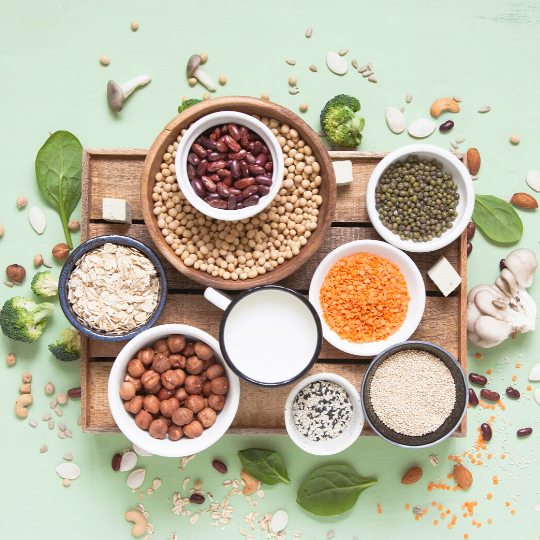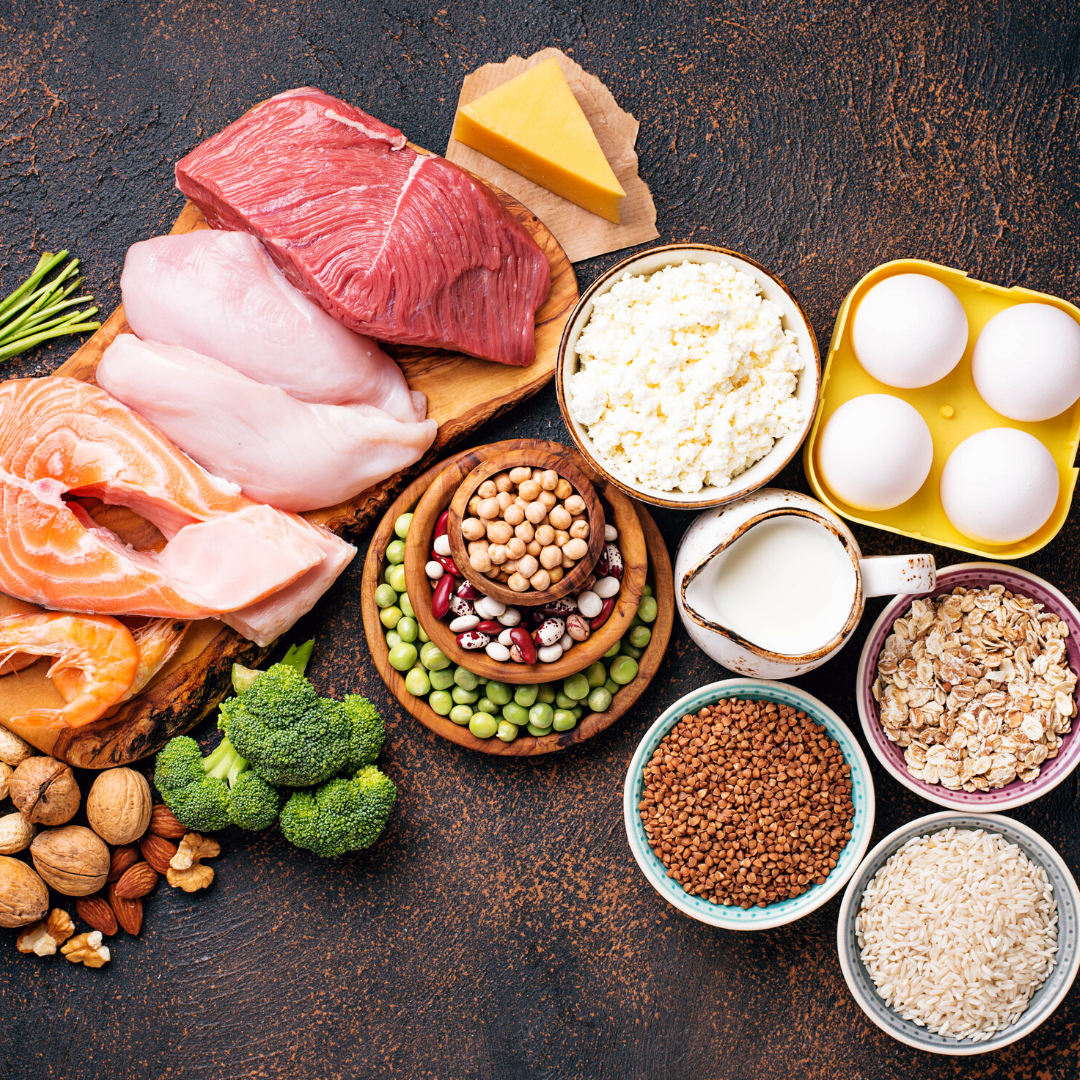
Proteins are known as the “building block” of our bodies, as they make up a large part of structures like our muscles, hair and hormones. Proteins are made up of chains of amino acids. There are around 20 amino acids and the order of these that make up the chains, determine what function that protein performs. Protein can be found in a variety of animal sources such as eggs, chicken, dairy, and plant produce like beans, nuts and lentils. Another source of protein is in the form of supplements, which are particularly popular in athletes or generally active people.
What Is The Importance Of Protein?
Protein is essential in the repair, maintenance and growth of muscle, which helps to prevent frailty, strength loss and muscle mass loss, particularly in older people. In the UK we have an ageing population, so protein is becoming more important for allowing the population to maintain independence. It is thought that there is a gradual decrease in muscle mass that starts in the mid to late 30s and is highlighted by the fact that there is a 30-50% decrease of muscle mass between the age of 40-80. In addition to this, a study has suggested that there is a rapid drop in muscle strength after 50 years old.
Is Animal Or Plant Protein Better?
The debate over what sources of protein are better for health and for the environment has become more prevalent in recent years, along with the rise of vegetarian and vegan diets. There have been studies that show the negative environmental and health concerns with animal protein, including diabetes, cancers and obesity. Although these concerns are justified, the current studies are unable to conclude whether all animal protein sources contribute equally to these concerns. On the other hand, animal produce contain other important nutrients such as Vitamin B12, creatine, and D vitamin cholecalciferol, amongst others. All of these nutrients are not available in plant-based foods, so balancing animal and plant protein or supplementing is important.
Plant proteins may not have the same concerns as animal sources, however one factor that needs to be studied more in depth is the effect that plant proteins have on appetite. Appetite has been found to be a big risk factor in malnutrition, which leads to muscle loss – so is something to consider when deciding where you get your protein from. Moreover, protein quality is usually measured by how easily digestible the protein is. It has been found that plant proteins are not as easily digested as animal proteins, therefore may not influence muscle function as efficiently. Plant proteins contain a high level of compounds called phytochemicals, which have recently been associated with regulating blood sugar levels and lowering the risk of some cancers. This again emphasises the importance of maintaining a balanced diet and, where possible, getting protein from a variety of sources that have their own benefits.
What Is The Optimal Protein Daily Intake?
The current recommended dietary allowance (RDA) is 0.8g per kilogram of your body weight regardless of your age. The current UK Reference Nutrient Intake (RNI) is 0.75g/kg of bodyweight regardless of age. The problem with these recommendations is that they are the minimum values that your body requires to simply live and they do not take into consideration any form of activity. This means that, unless you don’t move all day, it is likely that you require more protein daily to maintain, build and repair muscle.
With that in mind, a recent study looking at people with sedentary lifestyles found that they actually require more protein because they have lower rates of nitrogen retention. This becomes even more important with older age as activity levels tend to decrease, as well as muscle deterioration naturally increasing. With acknowledgment of these factors, the European Society for Clinical Nutrition and Metabolism (ESPEN) has provided new recommendations with particular reference to those over 65 years of age. For healthy people over 65 the recommended daily intake is 1.0-1.2g/kg of body weight, for people over 65 with acute or chronic illness it’s 1.2-1.5g/kg of bodyweight and finally 2.0g/kg of bodyweight for people over 65 with severe illness, injury or malnutrition. These change in guidelines was also due to new findings that starting at age 50, you experience a 0.5-1% loss of muscle mass yearly. The study followed two groups of people aged 70-79, one with an average protein intake of roughly 1.1g/kg of bodyweight and one with roughly a 0.8g/kg of bodyweight. The group who consumed over 1.1g per kg, lost 40% less lean body mass in comparison to the other group.
There are also other groups of people who are active and regularly exercise, whether that be lifting weights or running, who will need more protein to rebuild and grow their muscles, as well as avoid injury. This is also the case for people who have injuries and need to heal, as protein is important in most soft tissues and therefore it’s crucial to consume enough protein to maintain, grow or repair them.

How Should You Distribute Your Daily Protein Intake?
It is thought that 2-3 meals a day which each have about 25-30g of high-quality protein is an optimal amount to activate muscle protein synthesis for 24 hours. The protein quantity is set at around 25-30g because it has been shown that the intake of protein plateaus after 0.24g of protein per kg of body weight in men around 22 years of age and after 0.40g/kg of bodyweight in men around 70 years of age. Another study found no statistical difference in this ‘breakpoint’ between sexes in an age group, so these guidelines should also apply equally to women. This former study was analysing the effect of whey and egg protein sources, so plateaus in plant protein consumption are currently unknown.
To summarise, protein is the building block of most structures in our bodies, but play a big part in the correct function and maintenance of muscles. There are many sources of protein which can come from plants, animals or supplements which all have their own benefits. This makes it important to have, where possible, as much of a balanced diet as you can. Muscle mass and strength decrease with age so having enough protein is really important in the older population to help them lead a healthy life. The current recommended daily intake is much lower than the actual required levels of protein so make sure you’re eating at least 2-3 meals a day which contain 25-30g of protein. This will ensure your muscles are repairing optimally and helps decrease risk of pain and injury.
We hope you found this article helpful! To keep up to date with all of our new content, make sure to follow us on our social channels. If you have any questions at all, do feel free to get in touch with us – either by calling on 02039473222 or emailing us at info@themayfairclinic.com.
Contact Us.
Email Us
info@themayfairclinic.com
Call Us
0203 947 32 22
Clinic Address
4 Cavendish Square, London, W1g 0PG.